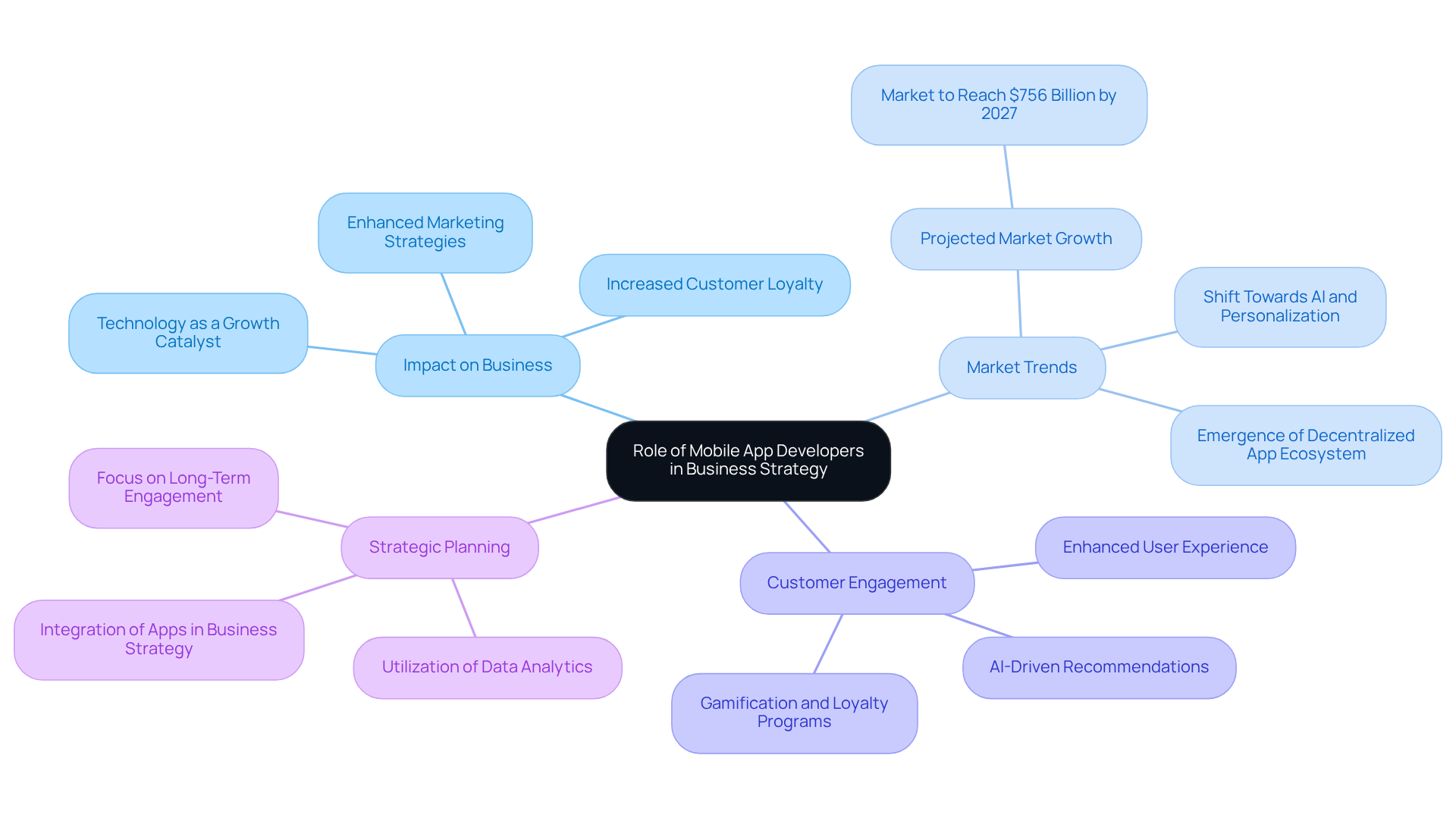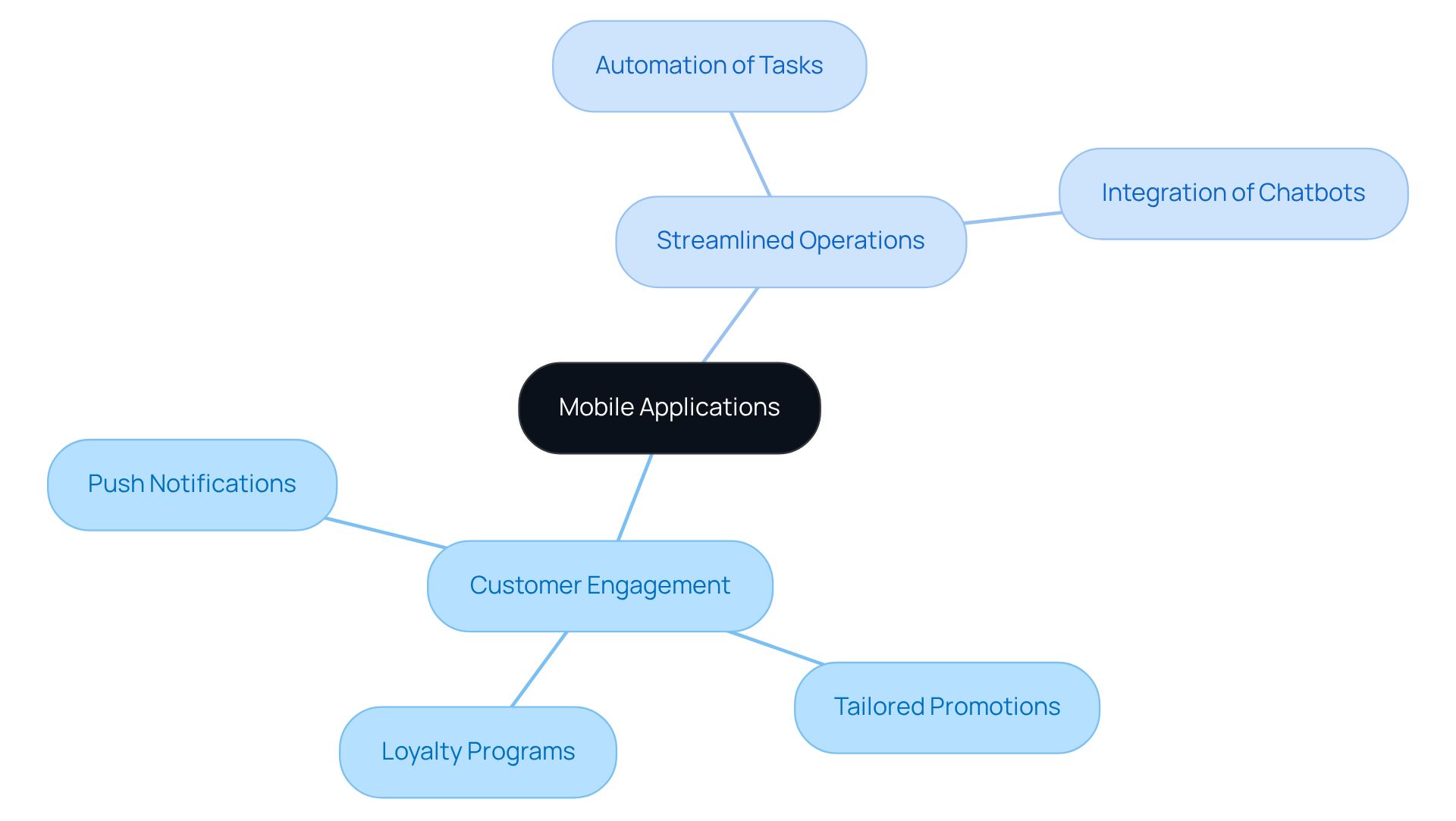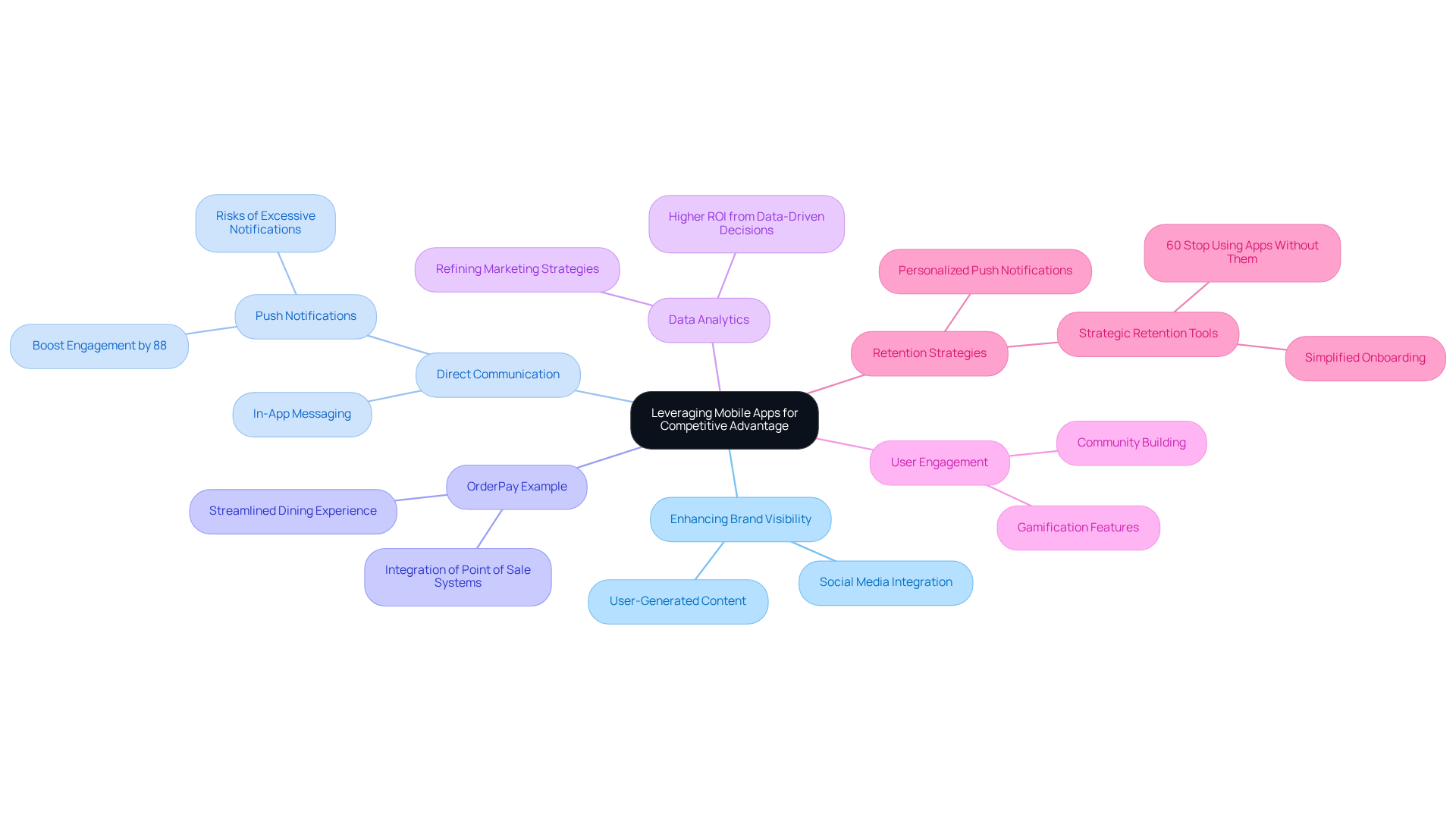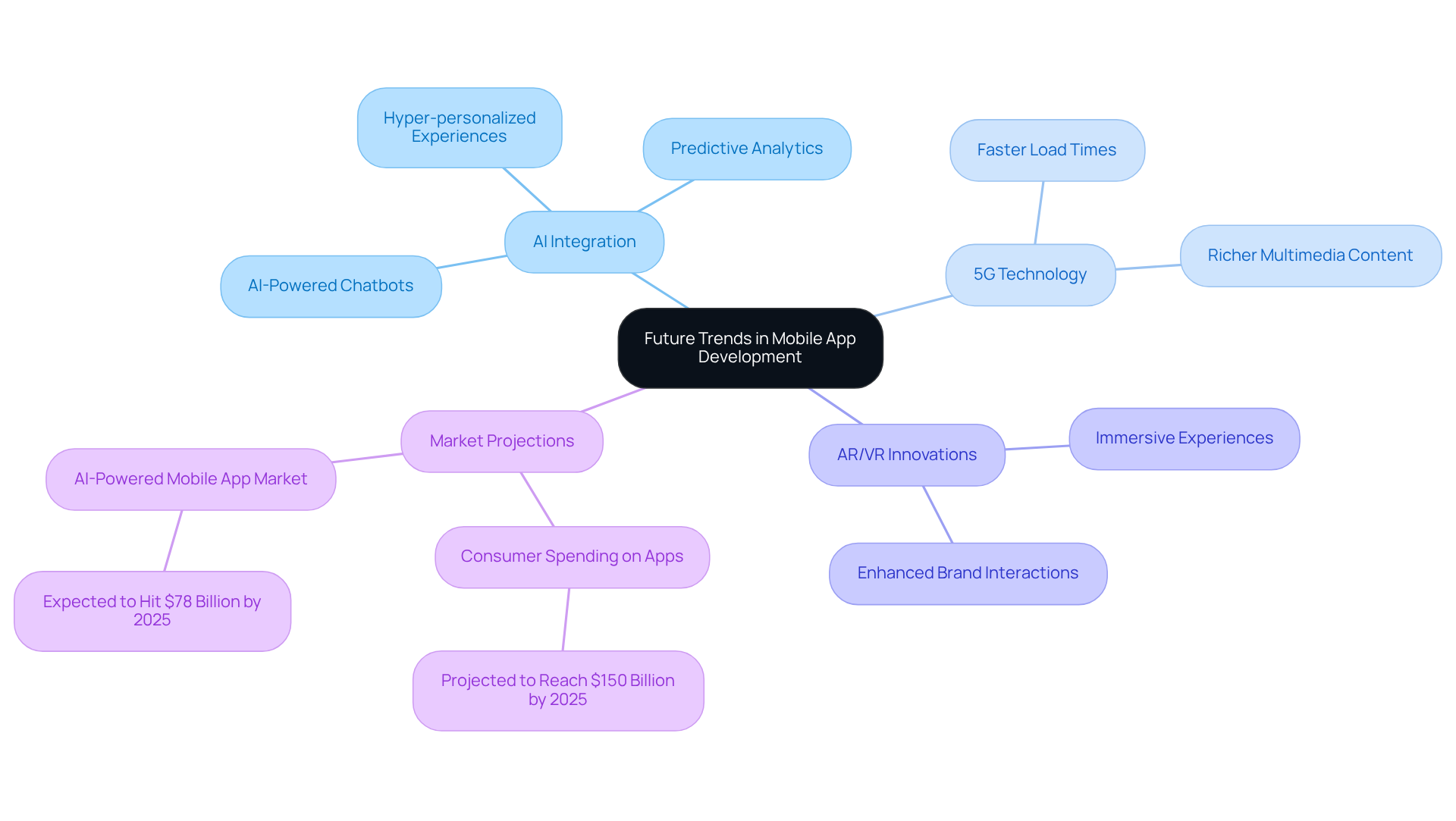AI
our blog
Why Mobile Apps Developers Drive Business Success in 2025

Overview
In 2025, mobile app developers are at the forefront of driving business success by creating applications that significantly enhance customer engagement, streamline operations, and provide a competitive edge through innovative technologies. Businesses that leverage mobile applications can expect to see substantial increases in customer loyalty and operational efficiency. Furthermore, they can capitalize on emerging trends such as AI integration and 5G technology to meet evolving consumer expectations.
The challenge lies in adapting to these rapid technological advancements. By integrating mobile solutions, organizations can not only improve their service delivery but also foster deeper connections with their customers. This strategic approach is essential for maintaining relevance in an increasingly digital marketplace. In addition, companies that embrace these innovations position themselves to outperform their competitors, ensuring long-term viability in their respective industries.
To fully realize these benefits, businesses must take actionable steps towards incorporating mobile applications into their strategies. This includes:
- Evaluating current operational processes
- Identifying areas for improvement
- Investing in the right technologies
By doing so, organizations can effectively navigate the complexities of modern consumer demands and unlock new growth opportunities.
Introduction
In a rapidly evolving digital landscape, mobile app developers are emerging as crucial players in driving business success. Organizations increasingly rely on innovative applications to enhance customer engagement and operational efficiency, positioning these developers as strategic partners in achieving corporate goals.
With the application market projected to soar to $756 billion by 2027, businesses must consider how to effectively leverage mobile app development—not only to keep pace but to gain a competitive edge.
Establish the Role of Mobile App Developers in Business Strategy
In 2025, application developers play a pivotal role in shaping strategies across various sectors. They not only create applications but also ensure these digital solutions align with the overarching goals of their organizations. By grasping market trends and user needs, developers can design applications that significantly enhance operational efficiency and customer engagement.
For instance, companies that integrate applications into their marketing strategies can connect with specific audiences more effectively, leading to increased sales and improved brand loyalty. In fact, businesses with applications see an average increase of 30% in customer loyalty.
The role of application developers extends beyond mere programming; they are integral to the strategic planning process, ensuring that technology serves as a catalyst for company growth. Given that 90% of time on devices is spent using applications, mobile apps developers need to integrate solutions for these platforms, as it is not just beneficial but essential for sustained success in a competitive landscape.
Furthermore, the application market is projected to reach $756 billion by 2027, underscoring the critical importance of app development in shaping future corporate strategies.

Enhance Customer Engagement and Streamline Operations Through Mobile Apps
Mobile apps developers have found that mobile applications have become indispensable tools for enhancing customer engagement and optimizing organizational operations. By 2025, organizations utilizing application software will offer round-the-clock access to their services, empowering customers to interact with brands at their convenience.
Features such as:
- Push notifications
- Tailored promotions
- Loyalty programs
cultivate deeper connections with customers, driving repeat business. Furthermore, applications enable the automation of routine tasks, including order processing and customer support, which can lead to significant reductions in operational costs and improvements in service delivery.
For instance, companies that integrate chatbots into their applications can deliver prompt support, increasing user satisfaction while allowing human resources to focus on more complex inquiries. This strategic deployment of mobile technology not only streamlines operations but also positions organizations to excel in an increasingly competitive market.

Leverage Mobile Apps for Competitive Advantage and Brand Visibility
In today's competitive landscape, mobile apps developers have made applications indispensable for businesses that are striving to enhance brand visibility and secure a competitive edge. By establishing a direct communication channel, applications empower brands to maintain a consistent presence in the daily lives of customers. A prime example is OrderPay, developed by Studio Graphene, which enables users to find their nearest bar or restaurant, explore menus, and settle their bills directly from their tables using their smartphones. This innovative solution not only streamlines the dining experience but also integrates multiple point of sale systems, catering to diverse venues and locations. The development of OrderPay encountered challenges, particularly the need for expedited delivery due to the COVID-19 outbreak, necessitating a swift and efficient approach to meet launch timelines.
Looking ahead to 2025, companies investing in mobile apps developers can leverage data analytics to refine their marketing strategies, ensuring that messaging resonates with targeted audiences. Businesses that engage mobile apps developers to utilize mobile app usage statistics for their decisions experience up to 2X higher ROI compared to those operating on assumptions. Furthermore, applications can foster user-generated content and facilitate social sharing, significantly amplifying brand reach. Brands that incorporate social media elements into their applications can encourage users to share their experiences, effectively transforming customers into enthusiastic brand advocates.
However, it is crucial to implement strategic retention tools, as 60% of individuals stop using an app within the first week without them. This approach not only enhances engagement but also increases visibility, positioning companies favorably in a crowded market. The collaborative development of platforms like OrderPay exemplifies how mobile apps developers can create customized applications that elevate user experiences and drive business success. In conclusion, investing in application development transcends mere visibility improvement; it entails crafting a seamless experience that meets the evolving demands of clients.

Explore Future Trends and Innovations in Mobile App Development
Looking ahead, several key trends are poised to redefine the work of mobile apps developers in application development in 2025 and beyond. The integration of artificial intelligence will be paramount, enabling applications to deliver hyper-personalized experiences that adapt in real-time to individual preferences and behaviors. This shift is underscored by the fact that over 75% of mobile device owners express a desire for AI-driven applications that offer smart recommendations and predictive analytics. As companies leverage AI, they can significantly enhance customer interaction; for instance, a US-based e-commerce retailer that worked with mobile apps developers saw a remarkable 40% increase in client engagement and a 30% rise in conversion rates through personalized recommendations.
The advent of 5G technology will further elevate app performance, facilitating richer multimedia content and faster load times—both essential for capturing and maintaining audience attention. Given that mobile applications account for nearly 70% of digital media time in the U.S., mobile apps developers must optimize performance to meet audience expectations. Innovations such as augmented reality (AR) and virtual reality (VR) are also expected to gain momentum, providing immersive experiences that transform brand interactions. For example, a fintech startup that implemented real-time fraud detection through an AI-powered app not only reduced financial losses by 25% but also bolstered user trust and satisfaction.
Moreover, consumer expenditure on applications is projected to reach $150 billion by 2025, highlighting the expanding market and the imperative for mobile apps developers to innovate in app development. The global AI-powered mobile app market is anticipated to hit $78 billion by 2025, further emphasizing the significance of AI in the industry.
Businesses that proactively embrace these trends will not only enhance their app offerings but also solidify their positions as leaders in their respective industries, ensuring they meet the evolving expectations of modern consumers.

Conclusion
In 2025, the role of mobile app developers in driving business success is paramount. They are not merely creators of applications; they are strategic partners who align digital solutions with the overarching objectives of their organizations. By comprehensively understanding market dynamics and user preferences, these developers craft applications that enhance operational efficiency, elevate customer engagement, and ultimately contribute to sustained business growth.
The article underscores several critical roles that mobile app developers fulfill. They enhance customer interactions through features like push notifications and loyalty programs, while also streamlining operations via automation. Furthermore, investing in mobile app development empowers companies to gain a competitive edge by leveraging data analytics and fostering direct communication with consumers. The anticipated growth of the app market accentuates the necessity for businesses to continuously adapt and innovate.
As the mobile app development landscape evolves, embracing emerging technologies such as AI and 5G will be essential for businesses striving to meet modern consumer expectations. Organizations that proactively engage with mobile app developers will not only improve their app offerings but also solidify their market positions. In a world where mobile applications are integral to daily life, the strategic integration of these tools is vital for long-term success and relevance in an increasingly digital marketplace.









